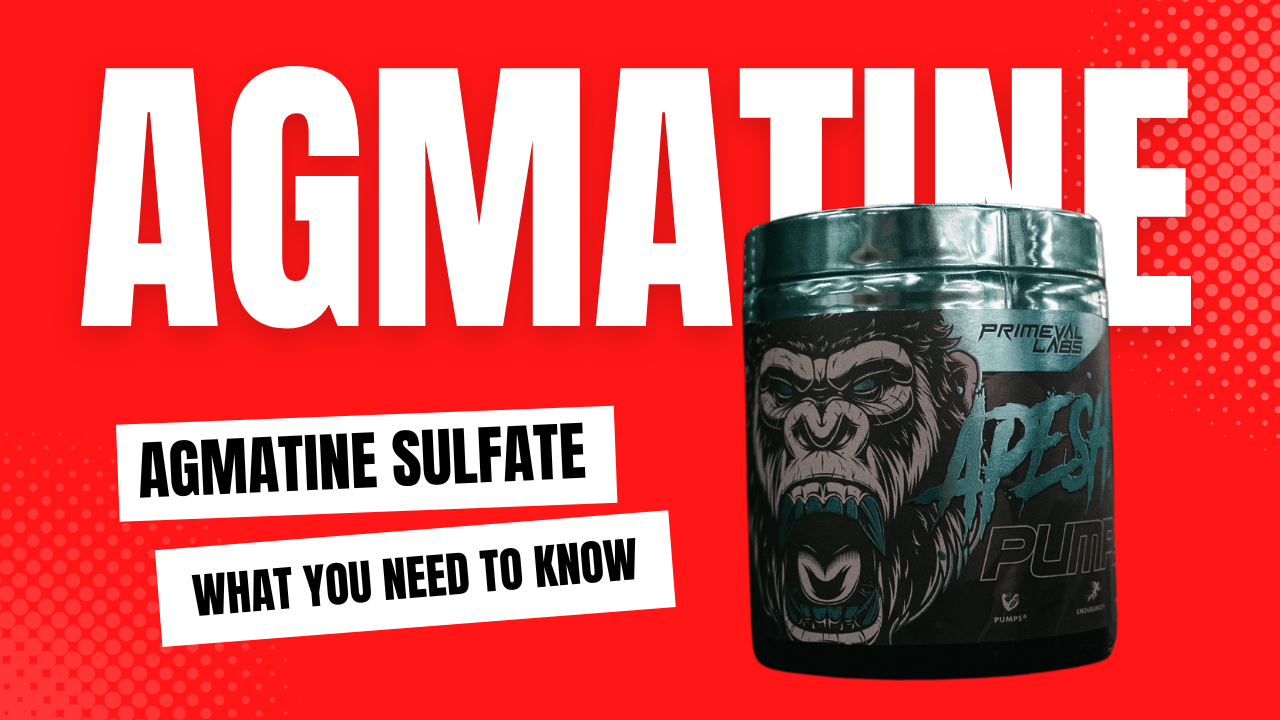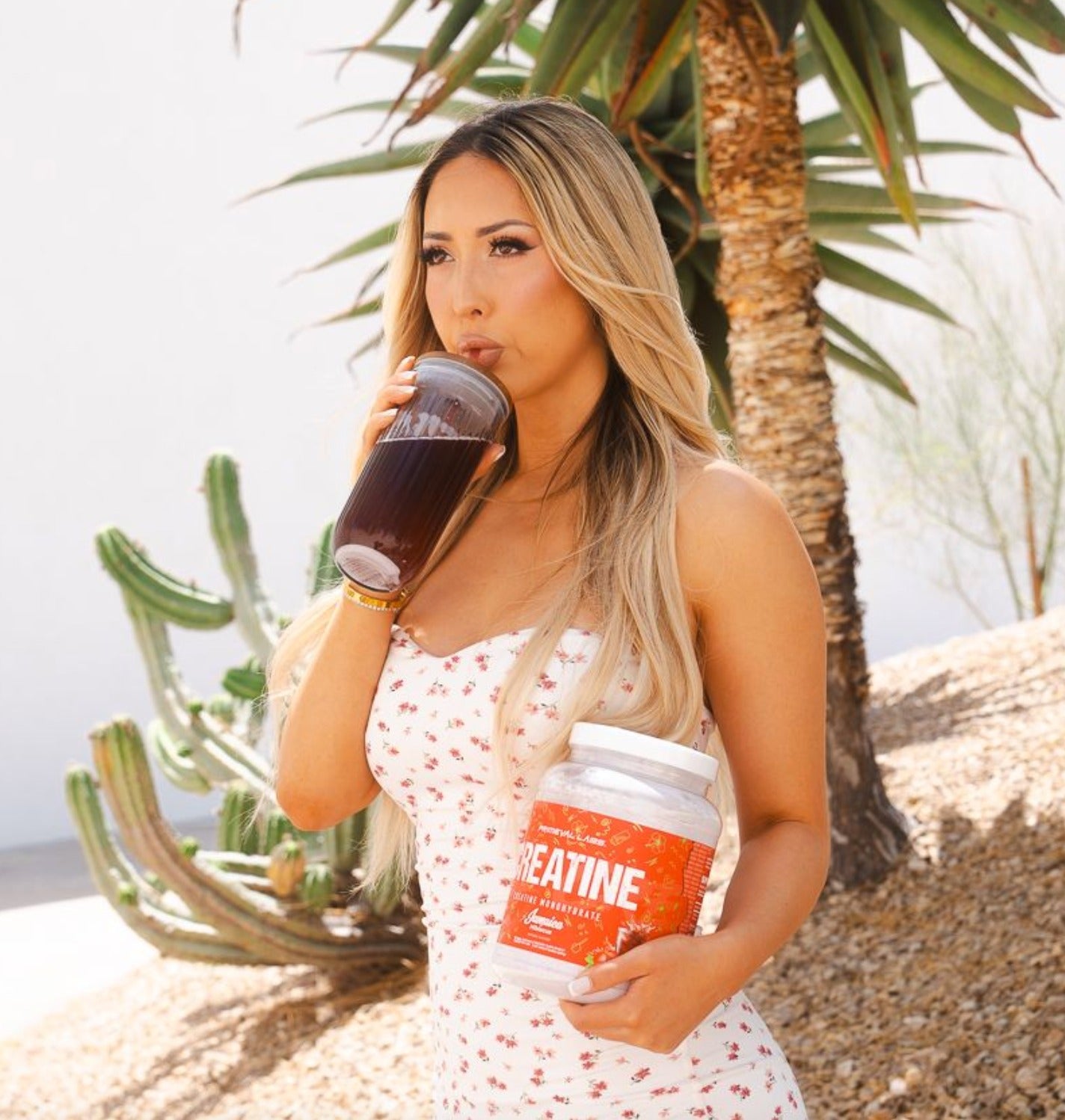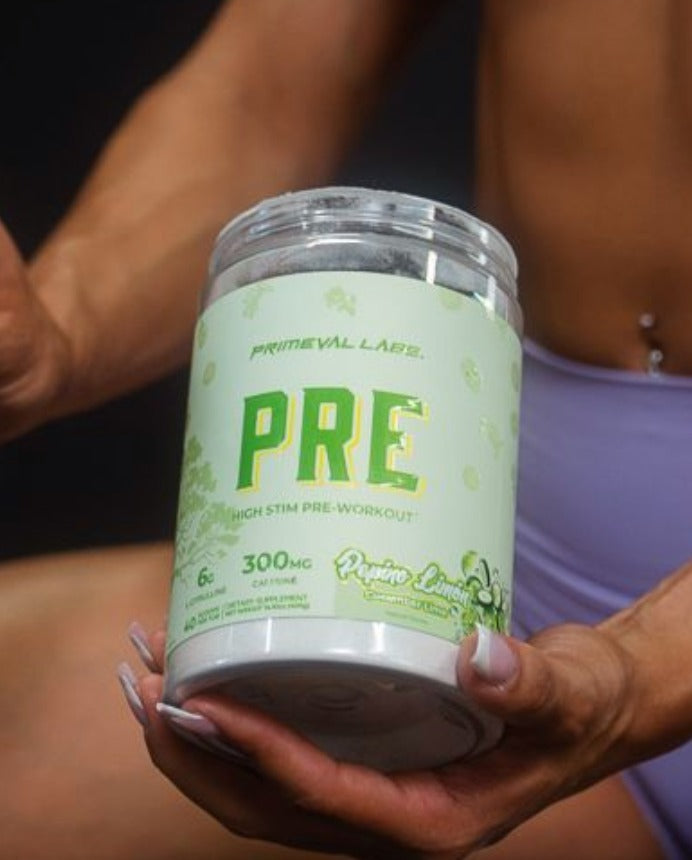When you think of “skin-tearing pumps” you almost always default to the best-known nitric oxide boosters such as L-Citrulline or Nitrosigine. However, there’s another ingredient that serves to bolster the body’s ability to generate increased nitric oxide production, blood flow, and muscle pumps -- Agmatine Sulfate
This is one ingredient that does a serious job of delivering hard, dense muscle pumps that last!
Not familiar with this ingredient?
No problem. We’ve got all the info you could possibly want on this top-tier nitric oxide booster!
What is Agmatine Sulfate?
Agmatine Sulfate, also known as (4-aminobutyl) guanidine, is a biogenic amine of the old favorite nitric oxide boosting amino acid L-Arginine.[1] Biogenic amines are compounds with one or more amine groups formed primarily from the decarboxylation of amino acids or by amination and transamination of ketones and aldehydes.
In other words, the carboxylic acid group attached to Arginine is cleaved off and the resulting by-product is what we know as Agmatine.
Where Can Agmatine Be Found?
Agmatine can be found throughout the body, including the:
- Skeletal muscles
- Heart
- Liver
- Stomach
- Intestines
It’s also synthesized and stored in glial cells of the brain and spinal cord, which provide metabolic and structural support for the central nervous system (CNS).
What Does Agmatine Do?
Enhance Cognitive Ability
Agmatine is first and foremost an incredibly powerful neurotransmitter and neuromodulator in the brain. It can cross the blood-brain barrier (BBB) and bind to the NMDA glutamate receptors.[2]
Since these receptors are involved with memory, synaptic plasticity, and long-term potentiation (LTP), agmatine may help enhance cognition, focus, and mood, which makes it a valuable addition to any pre-workout supplement!
Harder, Longer-Lasting Muscle Pumps
As we’ve already mentioned, agmatine sulfate is a powerful, yet underutilized, nitric oxide support supplement. So, how does it enhance muscle pumps?
Well, it works a bit differently than your conventional nitric oxide boosters that directly increase nitric oxide levels, such as L-Citrulline or grape seed extract.
Arginine is the amino acid that serves as the “fuel” for nitric oxide production. Arginase is the enzyme that metabolizes (breaks down) arginine, which reduces your body’s ability to generate substantial amounts of nitric oxide.[3]
Agmatine inhibits arginase, which means greater amounts of arginine are available for a longer period of time. This ultimately supports greater nitric oxide production and better blood flow for longer, yielding better athletic performance and stronger, longer-lasting muscle pumps!
Nutrient Partitioning and Glucose Disposal
Perhaps the most underrated benefit of Agmatine is its role as a nutrient partitioner and glucose disposal agent (GDA).
Agmatine activates the imidazoline receptors located in the adrenal glands to release β-endorphin, a molecule that facilitates glucose disposal from the blood into skeletal muscle tissue.[4,5]
In other words, agmatine helps bias carbohydrate storage towards skeletal muscles, supporting better athletic performance during training as well as improved body composition.
Aids Stress Management & Nerve Pain
Agmatine also offers a few other rarely-mentioned benefits. Acute supplementation of agmatine sulfate has been shown to reduce neuropathic pain and inflammation[6,7] as well as lower stress and anxiety by reducing cortisol levels in the body.[8,9]
By reducing pain, inflammation and cortisol, agmatine may promote quicker recovery helping hard-training athletes to train harder, more frequently, which facilitates greater gains in muscle, strength and body composition.
What Is the Optimal Dosage of Agmatine Sulfate?
Agmatine sulfate has been studied across a range of doses in both animals and humans between 1,250-7,500mg/day. [10]
Generally speaking for aiding athletic performance and nitric oxide production, agmatine sulfate is typically consumed in doses ranging from 750-3,000mg.
Keep in mind that individual body weight and use case will dictate the optimal dose for each athlete.
What Are the Side Effects of Agmatine Sulfate?
Agmatine sulfate has been studied numerous times and found to be well-tolerated and safe. That being said, some individuals may experience side effects, including:
- Upset stomach
- Nausea
- Bloating
- Diarrhea
- Low blood pressure
A simple way to limit the possibility of negative side effects is to follow the recommended dosage listed on the given supplement you are using.
What Are the Benefits of Agmatine Sulfate for a Bodybuilder?
Agmatine sulfate offers the potential for several benefits to bodybuilders. These occur mainly via its action on nitric oxide production and pain tolerance. The more blood that is delivered to working muscles, the more nutrients they are supplied with, which allows them to train harder for longer. Improving an individual’s pain tolerance also helps them to push further into a set, helping them eek out those essential muscle-building reps.
To summarize the benefits of agmatine sulfate for a bodybuilder:
- Greater nitric oxide production
- Train harder for longer
- Better muscle pumps
- Improved memory and cognition
- Reduced muscle soreness
- Pain relief
- Blood sugar and insulin support
- More favorable body composition
Takeaway
Agmatine sulfate is a versatile, powerful, and under-the-radar ergogenic that offers a vast array of benefits for bodybuilders and athletes. It helps improve athletic performance, muscle pumps, and stress management all while supporting cognitive function and cardiometabolic health.
With agmatine sulfate as one of the main ingredients, try one of our APE SH*T pump pre-workouts today.
References
- Grillo MA, Colombatto S. Metabolism and function in animal tissues of agmatine, a biogenic amine formed from arginine. Amino Acids. 2004;26(1):3-8. doi:10.1007/s00726-003-0030-z. https://link.springer.com/article/10.1007/s00726-003-0030-z
- Yang XC, Reis DJ. Agmatine selectively blocks the N-methyl-D-aspartate subclass of glutamate receptor channels in rat hippocampal neurons. J Pharmacol Exp Ther. 1999;288(2):544-549. https://www.ncbi.nlm.nih.gov/pubmed/9918557
- Durante W, Johnson FK, Johnson RA. ARGINASE: A CRITICAL REGULATOR OF NITRIC OXIDE SYNTHESIS AND VASCULAR FUNCTION. Clinical and experimental pharmacology & physiology. 2007;34(9):906-911. doi:10.1111/j.1440-1681.2007.04638.x. https://www.ncbi.nlm.nih.gov/pmc/articles/PMC1955221/
- Hwang S-L, Liu I-M, Tzeng T-F, Cheng J-T. Activation of imidazoline receptors in adrenal gland to lower plasma glucose in streptozotocin-induced diabetic rats. Diabetologia. 2005;48(4):767-775. doi:10.1007/s00125-005-1698-2. https://www.ncbi.nlm.nih.gov/pubmed/15756537
- Chang C-H, Wu H-T, Cheng K-C, Lin H-J, Cheng J-T. Increase of beta-endorphin secretion by agmatine is induced by activation of imidazoline I(2A) receptors in adrenal gland of rats. Neurosci Lett. 2010;468(3):297-299. doi:10.1016/j.neulet.2009.11.018. https://www.ncbi.nlm.nih.gov/pubmed/19913596
- Fairbanks CA, et al. Agmatine reverses pain induced by inflammation, neuropathy, and spinal cord injury. Proc Natl Acad Sci U S A. (2000) https://www.ncbi.nlm.nih.gov/pubmed/10984543
- Su RB, Li J, Qin BY. A biphasic opioid function modulator: agmatine. Acta Pharmacol Sin. (2003) https://www.ncbi.nlm.nih.gov/pubmed/12852826
- Taksande BG, et al. Agmatine, an endogenous imidazoline receptor ligand modulates ethanol anxiolysis and withdrawal anxiety in rats. Eur J Pharmacol. (2010) https://www.ncbi.nlm.nih.gov/pubmed/20394743
- Gong ZH, et al. Anxiolytic effect of agmatine in rats and mice. Eur J Pharmacol. (2006) https://www.ncbi.nlm.nih.gov/pubmed/17011547
- Ory Keynan, MD, Yigal Mirovsky, MD, Samuel Dekel, MD, Varda H. Gilad, CRA, Gad M. Gilad, PhD, Safety and Efficacy of Dietary Agmatine Sulfate in Lumbar Disc-associated Radiculopathy. An Open-label, Dose-escalating Study Followed by a Randomized, Double-blind, Placebo-controlled Trial, Pain Medicine, Volume 11, Issue 3, March 2010, Pages 356–368, https://doi.org/10.1111/j.1526-4637.2010.00808.x













Leave a comment
This site is protected by hCaptcha and the hCaptcha Privacy Policy and Terms of Service apply.